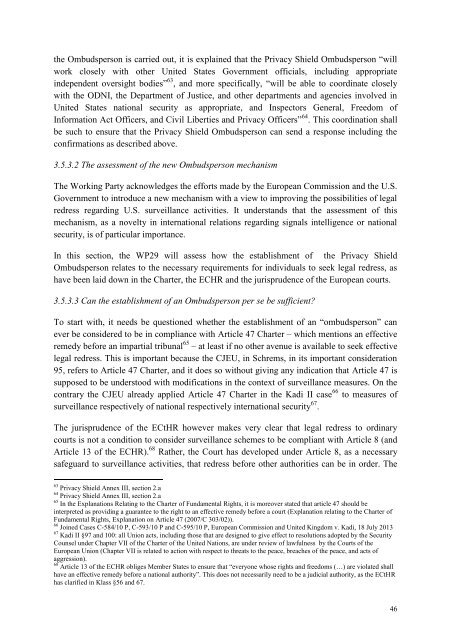ARTICLE 29 DATA PROTECTION WORKING PARTY
1SANK0H
1SANK0H
Create successful ePaper yourself
Turn your PDF publications into a flip-book with our unique Google optimized e-Paper software.
the Ombudsperson is carried out, it is explained that the Privacy Shield Ombudsperson “will<br />
work closely with other United States Government officials, including appropriate<br />
independent oversight bodies” 63 , and more specifically, “will be able to coordinate closely<br />
with the ODNI, the Department of Justice, and other departments and agencies involved in<br />
United States national security as appropriate, and Inspectors General, Freedom of<br />
Information Act Officers, and Civil Liberties and Privacy Officers” 64 . This coordination shall<br />
be such to ensure that the Privacy Shield Ombudsperson can send a response including the<br />
confirmations as described above.<br />
3.5.3.2 The assessment of the new Ombudsperson mechanism<br />
The Working Party acknowledges the efforts made by the European Commission and the U.S.<br />
Government to introduce a new mechanism with a view to improving the possibilities of legal<br />
redress regarding U.S. surveillance activities. It understands that the assessment of this<br />
mechanism, as a novelty in international relations regarding signals intelligence or national<br />
security, is of particular importance.<br />
In this section, the WP<strong>29</strong> will assess how the establishment of the Privacy Shield<br />
Ombudsperson relates to the necessary requirements for individuals to seek legal redress, as<br />
have been laid down in the Charter, the ECHR and the jurisprudence of the European courts.<br />
3.5.3.3 Can the establishment of an Ombudsperson per se be sufficient?<br />
To start with, it needs be questioned whether the establishment of an “ombudsperson” can<br />
ever be considered to be in compliance with Article 47 Charter – which mentions an effective<br />
remedy before an impartial tribunal 65 – at least if no other avenue is available to seek effective<br />
legal redress. This is important because the CJEU, in Schrems, in its important consideration<br />
95, refers to Article 47 Charter, and it does so without giving any indication that Article 47 is<br />
supposed to be understood with modifications in the context of surveillance measures. On the<br />
contrary the CJEU already applied Article 47 Charter in the Kadi II case 66 to measures of<br />
surveillance respectively of national respectively international security 67 .<br />
The jurisprudence of the ECtHR however makes very clear that legal redress to ordinary<br />
courts is not a condition to consider surveillance schemes to be compliant with Article 8 (and<br />
Article 13 of the ECHR). 68 Rather, the Court has developed under Article 8, as a necessary<br />
safeguard to surveillance activities, that redress before other authorities can be in order. The<br />
63 Privacy Shield Annex III, section 2.a<br />
64 Privacy Shield Annex III, section 2.a<br />
65 In the Explanations Relating to the Charter of Fundamental Rights, it is moreover stated that article 47 should be<br />
interpreted as providing a guarantee to the right to an effective remedy before a court (Explanation relating to the Charter of<br />
Fundamental Rights, Explanation on Article 47 (2007/C 303/02)).<br />
66 Joined Cases C-584/10 P, C-593/10 P and C-595/10 P, European Commission and United Kingdom v. Kadi, 18 July 2013<br />
67 Kadi II §97 and 100: all Union acts, including those that are designed to give effect to resolutions adopted by the Security<br />
Counsel under Chapter VII of the Charter of the United Nations, are under review of lawfulness by the Courts of the<br />
European Union (Chapter VII is related to action with respect to threats to the peace, breaches of the peace, and acts of<br />
aggression).<br />
68 Article 13 of the ECHR obliges Member States to ensure that “everyone whose rights and freedoms (…) are violated shall<br />
have an effective remedy before a national authority”. This does not necessarily need to be a judicial authority, as the ECtHR<br />
has clarified in Klass §56 and 67.<br />
46


